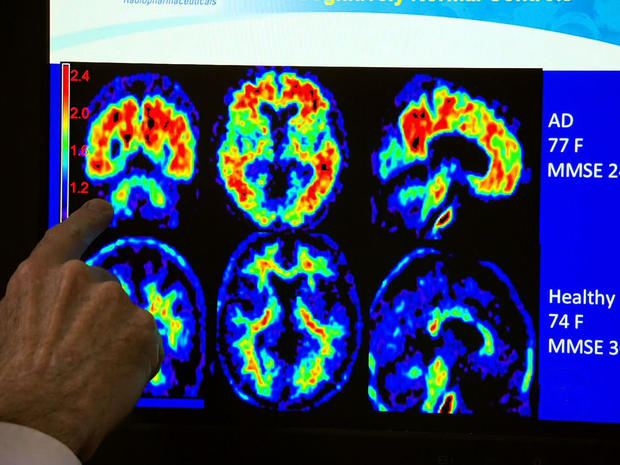Genetic mutation may protect against Alzheimer's, scientists find
(CBS News) A genetic discovery may provide more clues about how to protect against deadly Alzheimer's disease.
Researchers have discovered for the first time a genetic mutation that may protect people against the degenerative brain disease that affects almost 30 million people worldwide.
Results from key Alzheimer's studies could decide future of treatment
Watch: An Alzheimer's researcher who is also a patient
In the U.S. there's about 5.4 million people with the disease, but barring a medical breakthrough, researchers estimate by 2050 that the number of people with Alzheimer's will grow to 16 million.
For the new research, published in the July 11 issue of Nature, a team of scientists from Iceland took a closer look at what's called amyloid-beta precursor protein (APP).
APP was discovered about 25 years ago in patients with rare inherited forms of Alzheimer's that is developed in middle age, reports Nature News. According to the researchers, APP breaks down into amyloid-beta, which shows up as plaques in the brain that are a telltale marker of the disease. Scientists have debated whether the plaque buildup contributes to causing the disease or is caused by Alzheimer's.
The scientists in the new study compared the complete genome sequences of nearly 1,800 elderly Icelanders with their medical histories and discovered a genetic mutation in a gene that produces APP. The mutation was found to slow plaque formation in the brain by 40 percent.
Looking for the mutation in 400,000 Scandinavians, the researchers estimated that people who possess the mutation are more than five times as likely to reach 85 without developing Alzheimer's disease. People without Alzheimer's who had the mutation were also less likely to experience cognitive decline that comes with aging, suggesting that memory loss with aging and Alzheimer's disease may share a root cause.
"Pathologists have always suspected that there was a substantial overlap between Alzheimer's disease and normal age-related changes," study author Kári Stefánsson, chief executive of deCODE Genetics in Reykjavik, Iceland, told Nature News.
Since drug companies are currently investigating drugs that target amyloid production, as CBS This Morningreported in May, the new study may come as a sigh of relief for many scientists.
"Amyloid researchers the world over couldn't have asked for a better morale booster," Dr. Sam Gandy, chair of Alzheimer's disease research at Mount Sinai School of Medicine in New York City, said to WebMD. "This is a great gift to those at high risk for future development of Alzheimer's disease because this means our prevention trials are aiming at the right target."
Dr. David Altshuler, a genomics expert at Harvard Medical School told the New York Times that the study is "hugely important" for drug development.
owever, the Los Angeles Times reports on unpublished data that shows that the mutation is very rare in the U.S., found in about 1 out of every 100,000 people.
For the rest of us, other ways to reduce Alzheimer's risk may includeresistance training, engaging in brain-sharpening activities like crossword puzzles and writing, or maintaining good healh.

